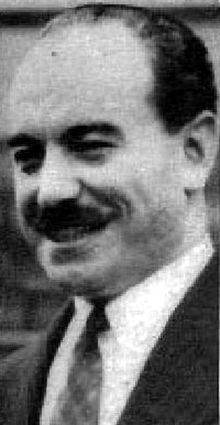Carlos Dávila
| Carlos Dávila | |
|---|---|
 |
|
| President of Government Junta of Chile | |
|
In office June 16, 1932 – July 8, 1932 |
|
| Preceded by | Arturo Puga |
| Succeeded by | Himself |
| President of Chile | |
|
In office July 8, 1932 – September 13, 1932 |
|
| Preceded by | Himself |
| Succeeded by | Bartolomé Blanche |
| Secretary General of the Organization of American States | |
|
In office 1954 – October 19, 1955 |
|
| Preceded by | Alberto Lleras Camargo |
| Succeeded by | José A. Mora |
| Personal details | |
| Born |
Carlos Gregorio Dávila Espinoza September 15, 1887 Los Ángeles, Chile |
| Died | October 19, 1955 (aged 68) Massachusetts, United States |
| Political party | Socialist Party |
| Spouse(s) | Herminia Arrate |
Carlos Gregorio Dávila Espinoza (September 15, 1887 - October 19, 1955), was a Chilean political figure, Chairman of Government Junta of Chile in 1932, and Secretary General of the Organization of American States from 1954 until his death in 1955.
Dávila was born in Los Ángeles, Chile to Luis Dávila and Emilia Espinoza. He graduated from the University of Santiago, Chile (then called School of Arts and Crafts) in 1907. In 1911, he entered Law School at the University of Chile, but dropped out three years later to work for newspaper “El Mercurio”, of Santiago. He left that paper in 1917 to establish “La Nación” of the same city, which he directed until 1927. In 1932, he founded the Chilean magazine, “Hoy”.
From 1927 to 1931, Dávila served as Chilean Ambassador to the United States. In 1929, he received an honorary LL.D. from Columbia University, and another the same year from the University of Southern California, in Los Angeles, California.
In 1932 Dávila was a member of the Government Junta and for several months provisional President of Chile.
In 1933, Dávila was visiting Professor of International Law at the University of North Carolina at Chapel Hill, under the auspices of the Carnegie Endowment for International Peace. Later he came to the United States and was associated for many years with the Editors’ Press Service, and acted as correspondent for numerous important South American newspapers. In 1941 he received the Maria Moors Cabot Award from Columbia University for his distinguished journalistic contribution in the service of the Americas. A prolific writer, Dávila is the author of “We of the Americas”, published in 1949 and has contributed many analytical studies on politics and economics to leading American publications.
...
Wikipedia
